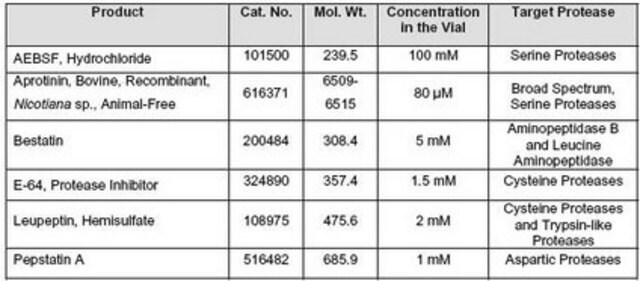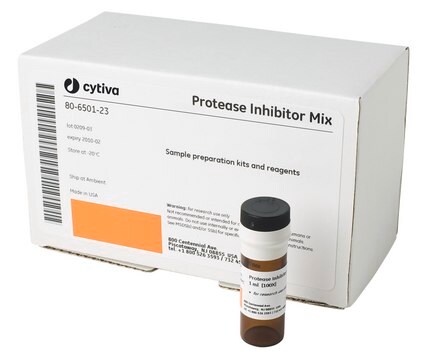539134
Protease Inhibitor Cocktail III
EDTA-Free, liquid, for the inhibition of aspartic, cysteine, and serine proteases and aminopeptidases in mammalian cells and tissues.
Synonym(s):
EDTA free Protease inhibitor, EDTA-Free Protease Inhibitor Mix, Protease inhibitor cocktail III
About This Item
Recommended Products
Product Name
Protease Inhibitor Cocktail Set III, EDTA-Free, Protease inhibitor cocktail III, EDTA-free for inhibiting aspartic, cysteine, and serine proteases as well as aminopeptidases in mammalian cells and tissues.
form
liquid
manufacturer/tradename
Calbiochem®
storage condition
OK to freeze
shipped in
wet ice
storage temp.
−20°C
Related Categories
General description
Specificity
Application
- as a component in CelLytic MT cell lysis reagent or lysis buffer to homogenize kidney organoids for immunoblot analysis
- as a component in homogenization buffer to homogenize minced mouse quadriceps femoris muscle tissue
- in lysis buffer to extract proteins for immunoblotting
Biochem/physiol Actions
Features and Benefits
- EDTA-Free: recommended for IMAC applications.
- Flexible: compatible with bacterial extracts, mammalian cell extracts, and tissue extracts.
- Fast: no waiting time for tablets to dissolve.
- Economical: ready-to-use format reduces wastage.
- Effective: one ml is sufficient for approximately 20g of tissue.
- Complete: contains six protease inhibitors to inhibit aspartic, cysteine, serine proteases, and aminopeptidases.
Warning
Reconstitution
Legal Information
Signal Word
Warning
Hazard Statements
Precautionary Statements
Hazard Classifications
Eye Irrit. 2 - Skin Irrit. 2
Storage Class Code
10 - Combustible liquids
WGK
WGK 2
Flash Point(F)
188.6 °F - (refers to pure substance)
Flash Point(C)
87 °C - (refers to pure substance)
Certificates of Analysis (COA)
Search for Certificates of Analysis (COA) by entering the products Lot/Batch Number. Lot and Batch Numbers can be found on a product’s label following the words ‘Lot’ or ‘Batch’.
Already Own This Product?
Find documentation for the products that you have recently purchased in the Document Library.
Customers Also Viewed
Our team of scientists has experience in all areas of research including Life Science, Material Science, Chemical Synthesis, Chromatography, Analytical and many others.
Contact Technical Service















